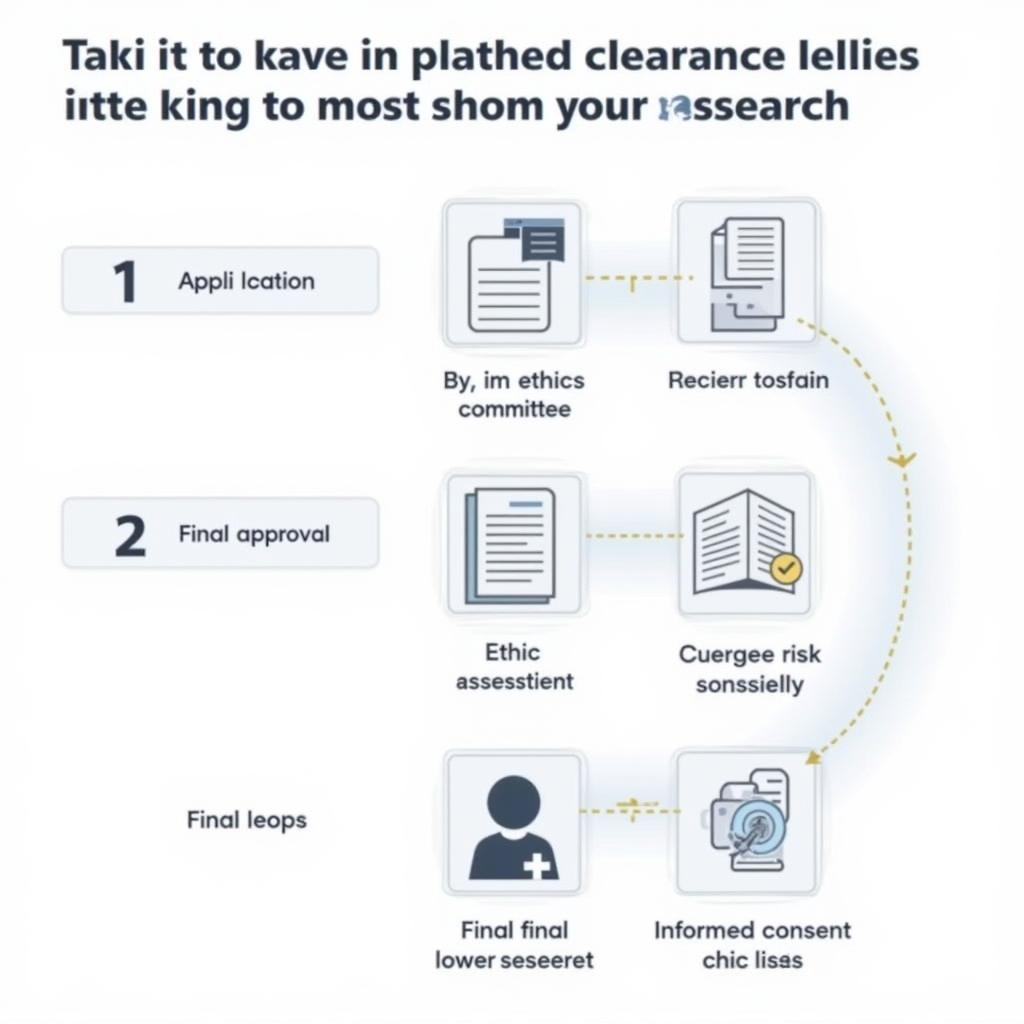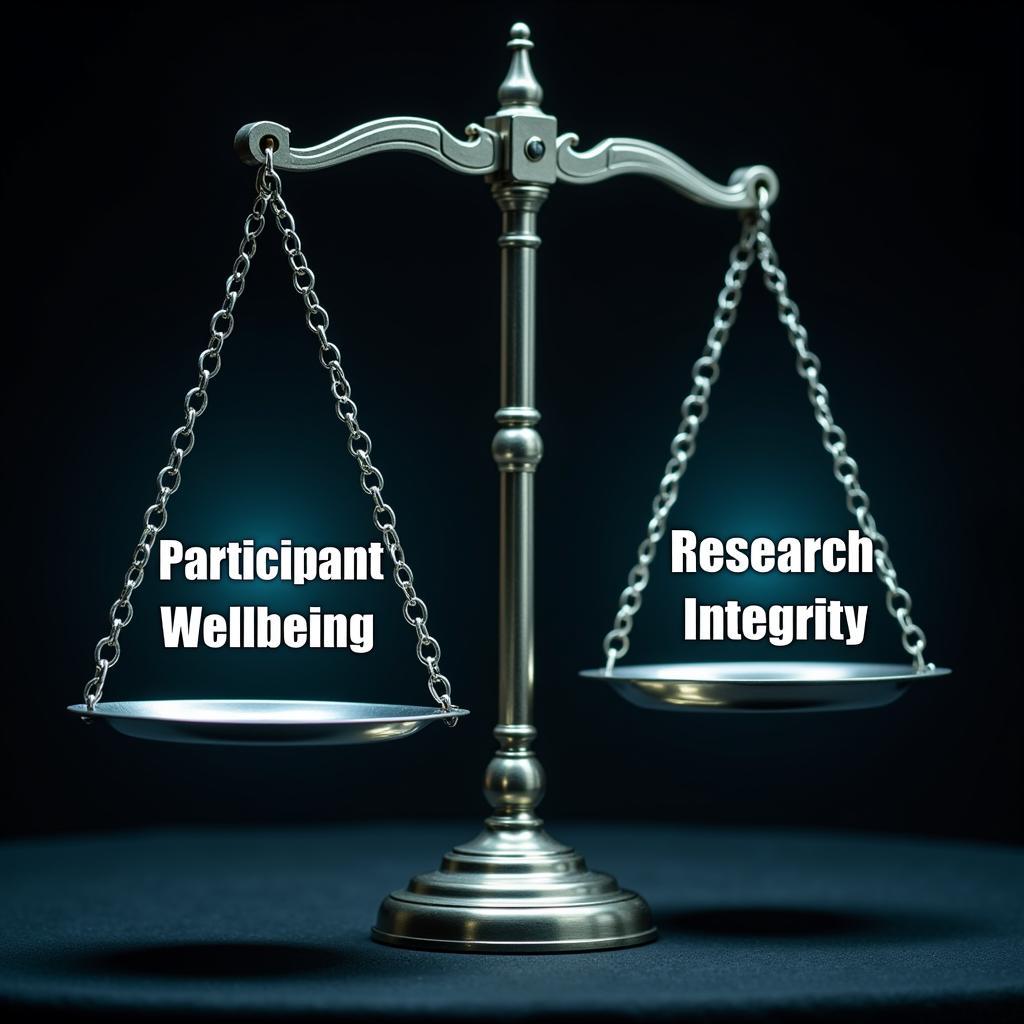Ethics Clearance For Research is a crucial step in any research project, especially those involving human participants. It ensures the study is conducted ethically and protects the rights and welfare of those involved. This process involves a thorough review of the research proposal by an ethics committee to assess potential risks and benefits, and to ensure adherence to ethical guidelines.
Why is Ethics Clearance Essential?
Ethics clearance is not just a bureaucratic hurdle; it’s a fundamental requirement for responsible research. It demonstrates a commitment to ethical principles and protects researchers from potential legal and reputational damage. More importantly, it safeguards the well-being of participants and upholds the integrity of the research process. Failing to obtain ethics clearance can lead to serious consequences, including the retraction of research findings and damage to the reputation of both the researcher and the institution.
Key Ethical Considerations in Research
Several key ethical principles guide the review process for ethics clearance. These include:
- Respect for persons: Acknowledging the autonomy and dignity of individuals, particularly vulnerable populations. This involves obtaining informed consent and ensuring participants understand the risks and benefits of the study.
- Beneficence: Maximizing potential benefits and minimizing potential harms to participants. This requires careful risk assessment and the implementation of safeguards to protect participants.
- Justice: Ensuring fairness in the selection of participants and the distribution of benefits and burdens of research. This means avoiding exploitation of vulnerable populations and ensuring equitable access to the benefits of research.
 Ethics Clearance Process Flowchart
Ethics Clearance Process Flowchart
The Ethics Clearance Process: A Step-by-Step Guide
The specific requirements for ethics clearance vary between institutions and research fields. However, the general process typically involves the following steps:
- Develop a research proposal: This should clearly outline the research question, methodology, participant recruitment, data collection, and analysis plans.
- Complete an ethics application form: This form requires detailed information about the research project, including potential risks and benefits, participant information, and informed consent procedures.
- Submit the application and supporting documents: These may include the research proposal, informed consent forms, recruitment materials, and any other relevant documents.
- Review by the ethics committee: The committee will carefully review the application and may request revisions or further information.
- Approval or rejection: The committee will either approve the research project, request revisions, or reject the application.
- Monitoring and reporting: Researchers are often required to submit progress reports and any adverse events to the ethics committee throughout the study.
Navigating Challenges in Obtaining Ethics Clearance
Obtaining ethics clearance can sometimes be challenging, especially for complex or sensitive research projects. Common challenges include:
- Ambiguous ethical guidelines: Interpreting ethical guidelines can be subjective and require careful consideration.
- Conflicting interests: Researchers may face conflicts of interest, such as financial incentives or personal biases, that need to be addressed transparently.
- Vulnerable populations: Research involving vulnerable populations, such as children or individuals with cognitive impairments, requires extra scrutiny and safeguards.
“Ethics clearance is not merely a checkbox exercise,” states Dr. Amelia Hernandez, a renowned bioethicist. “It’s a continuous process of reflection and engagement with ethical principles throughout the research lifecycle.”
Ethics Clearance for Paranormal Research: A Unique Perspective
Paranormal research presents unique ethical challenges. While it might not involve physical risks like medical research, there are potential psychological and emotional risks that must be considered.
- Psychological impact: Investigating paranormal phenomena can be emotionally taxing, especially for individuals who believe they have experienced such phenomena. Researchers must ensure participants are adequately prepared for potential psychological distress.
- Deception and manipulation: Some paranormal investigations may involve deception or manipulation, such as staged events or suggestive questioning. These practices raise ethical concerns and require careful justification.
- Confidentiality and anonymity: Participants in paranormal research may be reluctant to disclose their experiences due to fear of stigma or ridicule. Researchers must guarantee confidentiality and anonymity to protect participants’ privacy.
“Paranormal Research requires a nuanced approach to ethics,” emphasizes Dr. Jasper Blackwood, a leading parapsychologist. “Researchers must be sensitive to the unique vulnerabilities and concerns of individuals who have experienced paranormal phenomena.”
 Ethical Considerations in Paranormal Research
Ethical Considerations in Paranormal Research
Conclusion: Ethics Clearance is Paramount
Ethics clearance for research is an essential process that protects participants, upholds research integrity, and advances knowledge responsibly. While the process can be challenging, it is a crucial step in ensuring ethical and responsible research practices. By adhering to ethical principles and navigating the complexities of the clearance process, researchers can contribute to a more ethical and trustworthy research environment. Remembering that ethics clearance for research is vital for both credibility and ethical conduct is key.
FAQ
What is the purpose of ethics clearance?
To protect the rights and welfare of research participants and ensure the ethical conduct of research.
Who grants ethics clearance?
An Institutional Review Board (IRB) or Ethics Committee.
What information is needed for an ethics application?
Details about the research project, including methodology, participant recruitment, data collection, risks and benefits, and informed consent procedures.
What are the consequences of not obtaining ethics clearance?
Retraction of research findings, damage to reputation, and potential legal action.
How long does it take to obtain ethics clearance?
It varies depending on the institution and complexity of the research, but it can take several weeks or months.
Need support with your research? Contact us at Phone Number: 0904826292, Email: research@gmail.com or visit us at No. 31, Alley 142/7, P. Phú Viên, Bồ Đề, Long Biên, Hà Nội, Việt Nam. We have a 24/7 customer support team.